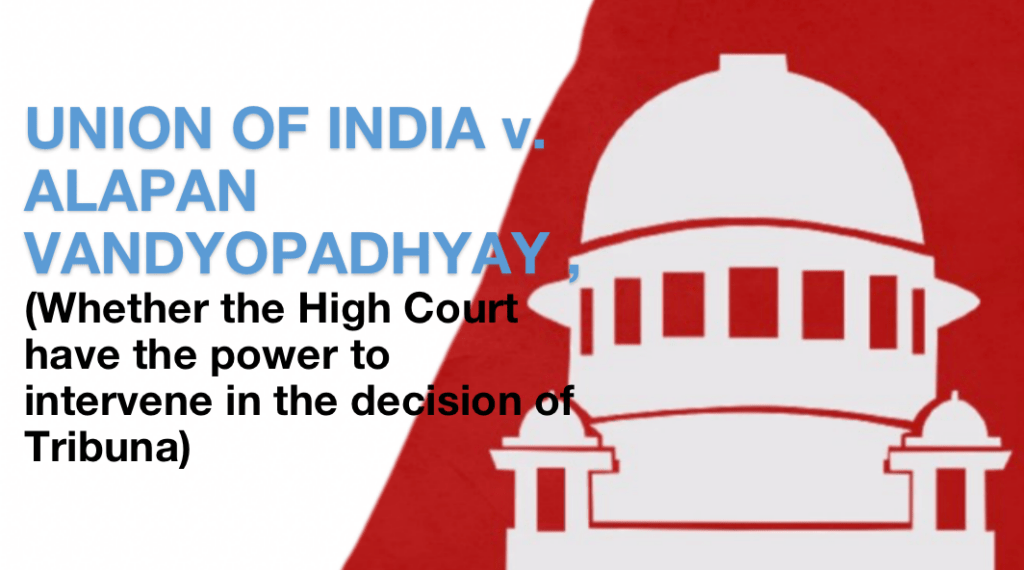
| Case Name : | UNION OF INDIA v. ALAPAN VANDYOPADHYAY |
| Equivalent citation: | SLP © No. 18338/2021 |
| Date of Judgement: | 6th January 2022 |
| Court: | The Supreme Court of India |
| Case no: | Appeal No. 197 of 2022 |
| Case Type: | Civil Appeal |
| Petitioner: | Union of India |
| Respondent: | Alapan Vandyopadhyay |
| Bench: | Justice AM Khanwilkar and Justice CT Ravi kumar |
FACTS OF THE CASE:
- An IAS officer who was the respondent was employing as a chief secretary with the west Bengal government and was required to do so, till he attained superannuation, which was due on 31st may 2021. The state government requested the union to extend his service for three months till August, which was allowed by the Union and his tenure got extended by official notification.
- On the day 26th may, 2021, a cyclone YAAS had hit parts of West Bengal and Odisha. and On 31st may,2021, a show cause Notice was issued by the Ministry of Home Affairs to the respondent for abstaining himself from a crucial review meeting chaired by the honorable Prime Minister Narendra Modi on 28th may,2021 , for the assessment of loss of life and property and damage to the infrastructure caused by the cyclonic storm.
- On 16th may, 2021, a major penalty charge sheet was issued to the respondent by the petitioner herein, for not attending the aforesaid meeting on 28.05.2021, as well as for not giving assessment to the Honorable Prime Minister about the hardships and sufferings faced by the people of West Bengal, amongst other allegations mentioned in the statement of Articles of charges and of the alleged misconduct or misbehavior.
- Charge sheet was issued under Rule 8 of All India Services (Discipline and Appeal) Rules, 1969 read with Rule 6 of All India Services (DCRB) Rules. Respondent replied to the charge sheet by filing his written statement. On 31.08.2021, orders were issued with appointing the Inquiring Authority and the presenting officer. Notice dated 27.09.2021, the inquiring Authority scheduled a preliminary hearing for 18.10.2021.
- On receipt of the hearing notice by the court, respondent filed an application under Section 19 of the Administrative Tribunal Act, 1985 challenging the charge sheet dated 16.06.2021 and the consequential orders thereto appointing the Inquiring Authority etc.
- The Original Application was fixed on 22.10.2021, before the Tribunal, Kolkata Bench. However, in the meantime, petitioner herein filed a Transfer petition before the Tribunal, Principal Bench, under section 25 of the 1985 Act, seeking transfer of the O.A. filed by the respondent, from Kolkata Bench to the Principal Bench at New Delhi.
- Order dated 22.10.2021, the Tribunal, Principal Bench allowed the Transfer petition and directed listing of the admission, on 27.10.2021. Order was challenged by the respondent by filing writ petition before the Calcutta High Court under Article 226 of the Constitution of India.
- On 27.10.2021, Notice was issued by the Tribunal, Principal Bench in O.A. Notice was accepted on behalf of the petitioner and time was granted to file reply. The matter was adjourned to 12.11.2021.
- The Calcutta High Court vide Judgement dated 29.10.2021, allowed the writ petition filed by the respondent and set aside the order of the tribunal , Principal Bench , passed in the Transfer Petition.
- Petitioner herein, challenged the Judgement dated 29.10.21, before the Honorable Supreme Court , primarily on the ground that the Calcutta High Court lacked the territorial jurisdiction to entertain a challenge to an order passed by the Principal Bench, New Delhi.
ISSUE RAISED:
- Whether the Calcutta High Court have the territorial jurisdiction to entertain the challenge?
- Whether the transfer of original application from Kolkata Bench to the Principal Bench at New Delhi is valid under section 25 of the Administrative Tribunal Act, 1985?
- Whether the High Court have the power to intervene in the decision of Tribunals? If yes, then which High Court?
RELATED PROVISIONS
- Section 25 of the Administrative Tribunals Act, 1985
Power of chairman to transfer cases from one Bench to another
- Rule 6 of the Central Administrative Tribunal (Procedure) Rules,1987
Place of filing applications
CONTENTONS OF THE PETITIONERS:
- The contentions of learned Solicitor General was that a challenge against the order passed by the Central Administrative Tribunal, Principal Bench at New Delhi, was maintainable only before the High Court of Delhi as the Principal Bench of the Tribunal lies within its territorial jurisdiction. It was held in L.Chandra Kumar vs. Union of India that the power vested in the high court to exercise judicial superintendence over the decisions of all courts and tribunals within the respective jurisdiction is also part of the basic structure of the constitution.
- The Counsel relying on the decision in Union of India vs. A. Shainamol , IAS and Anr. , it is contended that the mere residence of the applicant in a certain place would not amount to cause of action conferring jurisdiction upon the Bench of the Tribunal located at that place.
- The learned Solicitor General relied on the decision of the Court in JK Industries Ltd. & And. vs. Union of India & Ors. , to contend that Rule 6 of the Procedural Rules ought not to have been interpreted by the High Court so as to take away Chairman’s jurisdiction to transfer a case under section 25 of the Act as the cardinal principal of interpretation is that a rule made under a statute could not override or supersede a provision of the parent statute itself.
CONTENTIONS OF THE RESPONDENTS:
- Dr. Abhishek Manu Singh, learned Senior Counsel for the respondent supported the impugned judgement and final order of the Calcutta High Court. It’s submitted that the High Court is justified in entertaining the order of transfer passed in P.T.No. 215/2021 fell within its power of judicial superintendence.
- He further contended that it could not be said that the power under section 25 of the Act was taken away solely because Rule 6 of the Procedure Rules was relied on to upturn the order.
- The learned counsel further contended that the High Court had rightly exercised the power of judicial review and looked into the correctness of the order of transfer passed by the chairman of the Tribunal (the Principal Bench of the Tribunal) in the invocation of the power under Section 25 of the Act.
RATIO DECIDENDI:
- The Supreme Court observed that as per Section 25 of the Act, an independent application for transfer of an original Application filed and pending before any bench of the tribunal could be filed and the power to transfer the application lies with the chairman. The Section mandated that if such an application is made, notice of it has to be given to the opposite party.
- Evidently, the said section recognizes, the fundamental principles of justice and fair play namely that justice must not only be done but it must be seen to have been done It could also be exercised on establishing any other sufficient and sustainable grounds. This power is to be used with great intellect and sparingly.
- Hence, the order of Calcutta High Court was granted without jurisdiction and was held to be void ab initio. Noticing that the High Court at Calcutta has usurped jurisdiction to entertain the Writ petition, challenging the order passed by the Central Administrative Tribunal, New Delhi, even after taking note of the fact that the Principal Bench of the Tribunal does not lie with its territorial Jurisdiction, the Court set aside the impugned judgement.
JUDGEMENT:
- The Supreme Court bench of Justice AM Khanwilkar and Justice CT Ravi Kumar, upheld the position laid down by the constitution Bench in case of L. Chandra Kumar, that any decision of such a Tribunal, including the one passed under section 25 of the Administrative Tribunals Act, 1985 could be subjected to scrutiny only before a Division Bench of High Court within whose jurisdiction the Tribunal concerned falls.
- The Constitution Bench has held that all decisions of Tribunals created under Article 323A and Article 323B of the Constitution will be subject to the scrutiny before a Division Bench of the High Court within whose jurisdiction the concerned Tribunal falls.
- The Supreme Court held that the order of Calcutta High Court was passed without jurisdiction and was held to be void ab initio. Only the Delhi High have the jurisdiction to look into this matter.
CONCLUSION:
Constitution of India also said about the jurisdiction of the respective courts and the Tribunals get their source from the constitution itself, so the Tribunals should also follow the decided jurisdiction otherwise the decision said to be void ab initio by the Apex Court of the country.
Written by Harshita Sharma, 6th Semester of Barkatullah University, Department of Law , Bhopal.





0 Comments